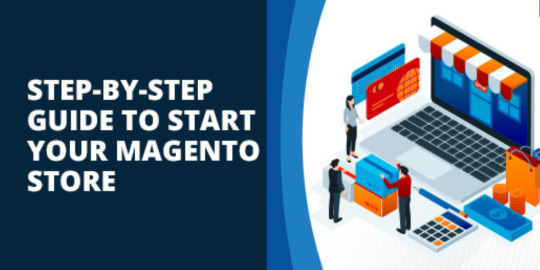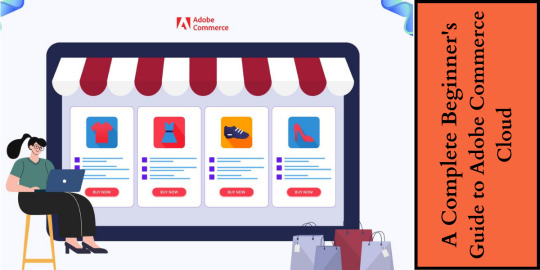Don't wanna be here? Send us removal request.
Text
How Facebook Ad Services Reach Your Ideal Audience?
More than any other tool in the fast-evolving world of digital marketing, Facebook has become the go-to marketing platform for any business that seeks to target its audience. With over 2.8 billion monthly active users, the possibility to target potential customers has been made easier on the site. The main attribute behind Facebook’s advertising expertise is its sturdy ad services that allow corporations to fine-tune their ads and reach out to their target market efficiently.
In this blog, we have discussed the use of Facebook Ads in reaching your targeted public and how it is possible to improve the targeting for higher growth.
0 notes
Text
How to Get Started with Magento Commerce: A Step-by-Step Guide

Why Choose Magento Commerce?
Magento Commerce, a leading ecommerce platform, offers a comprehensive suite of tools and features designed to help businesses thrive in the digital marketplace. Known for its scalability, flexibility, and extensive customization options, Magento Commerce is an ideal choice for businesses of all sizes. Whether you're seeking robust magento ecommerce solutions or working with a magento ecommerce agency, this guide will walk you through the essential steps to get started with Magento Commerce.
Step 1: Understanding the Requirements for Magento Commerce
Before diving into the setup process, it's crucial to understand the system requirements for running Magento Commerce smoothly. This includes:
Server Requirements: Ensure your hosting environment meets Magento’s technical specifications, including PHP, MySQL, and Apache/Nginx compatibility.
Hardware Requirements: Adequate server resources, such as sufficient RAM, CPU, and storage, are essential for optimal performance.
Software Requirements: Necessary software includes Composer, a suitable PHP version, and other dependencies specified in Magento’s documentation.
Step 2: Choosing the Right Magento Commerce Plan
Magento Commerce offers several plans tailored to different business needs. Assess your business size, budget, and specific requirements to choose the appropriate plan. Options include:
Magento Open Source: A free version with basic features suitable for small businesses.
Magento Commerce (Cloud): A paid version with advanced features, cloud hosting, and enhanced support.
Consulting with a magento ecommerce agency can help you select the best plan to match your business objectives and growth potential.
Step 3: Setting Up Your Hosting Environment
Choosing the right hosting environment is critical for the performance and reliability of your Magento store. Consider the following options:
Shared Hosting: Cost-effective but may lack the performance needed for larger stores.
Dedicated Hosting: Offers better performance and control but at a higher cost.
Cloud Hosting: Scalable and flexible, suitable for growing businesses with fluctuating traffic.
Ensure your hosting provider offers robust security measures and 24/7 support.
Step 4: Installing Magento Commerce
With your hosting environment set up, the next step is to install Magento Commerce. Follow these steps:
Download Magento Commerce: Obtain the latest version from the Magento website.
Upload Files: Transfer the Magento files to your server using FTP/SFTP.
Set Up Database: Create a new MySQL database for Magento.
Run the Installation Wizard: Access the installation wizard through your browser and follow the prompts to complete the setup.
Step 5: Configuring Your Store Settings
After installation, configure your store settings to ensure optimal performance and functionality:
General Settings: Set your store name, address, email, and other basic information.
Locale Options: Configure your time zone, currency, and language preferences.
Tax Settings: Set up tax rules according to your business location and legal requirements.
Step 6: Customizing Your Store’s Appearance
Magento Commerce allows extensive customization to reflect your brand identity. Key customization options include:
Themes: Choose from pre-built themes or create a custom design to enhance your store’s visual appeal.
Layout: Configure layouts for different pages, including the homepage, category pages, and product pages.
Branding: Add your logo, brand colors, and custom fonts to create a cohesive brand experience.
Step 7: Adding Products to Your Magento Commerce Store
Populate your store with products by following these steps:
Product Categories: Organize products into categories for easy navigation.
Product Listings: Add detailed product information, including names, descriptions, prices, and images.
Inventory Management: Configure stock levels, SKU numbers, and other inventory settings.
Utilize Magento’s bulk upload feature to save time when adding multiple products.
Step 8: Setting Up Payment and Shipping Options
Configure payment and shipping options to provide a seamless checkout experience:
Payment Methods: Integrate popular payment gateways like PayPal, Stripe, and credit cards.
Shipping Options: Set up shipping methods, rates, and regions. Offer options like free shipping, flat rate, and carrier-specific methods.
Ensure your payment and shipping configurations comply with your business model and customer expectations.
Step 9: Testing Your Store Before Launch
Before going live, thoroughly test your Magento store to identify and fix any issues:
Functionality Testing: Ensure all features work as expected, including product search, checkout process, and payment gateway integration.
Performance Testing: Test your store’s speed and responsiveness to ensure a smooth user experience.
Security Testing: Verify that your store is secure, with measures in place to protect against threats like SQL injection and cross-site scripting.
Step 10: Launching Your Magento Commerce Store and Post-Launch Tips
With testing complete, you’re ready to launch your Magento Commerce store. Follow these final steps:
Go Live: Make your store accessible to the public by updating DNS settings and removing any maintenance pages.
Monitor Performance: Continuously monitor your store’s performance, traffic, and sales.
Regular Updates: Keep your Magento installation, themes, and extensions updated to ensure security and functionality.
Seek Professional Help: Work with a magento ecommerce agency for ongoing support and optimization.
Related Post: A Complete Guide to Magento eCommerce: All You Need to Know
0 notes
Text
Magento Vs BigCommerce: The Right Ecommerce Platform for You?
Online shopping has taken the world by storm, and by 2021 the global eCommerce market is expected to reach a value of US $4.5 trillion. Australia is among the top 10 global markets for eCommerce, with an approximate valuation of $29.65 billion by 2021 and a fast growth projection. More people are turning to online shopping, making this the ideal time to have an ecommerce website. With modern eCommerce platforms, launching an eCommerce business is simple, manageable and affordable. However, with the numerous eCommerce platforms available, choosing the right one can be difficult. Magento and BigCommerce are two of the leading eCommerce platforms available.
In this blog, we will discuss in details that Magento Vs BigCommerce: The Right Ecommerce Platform for You?
0 notes
Text
A Complete Guide to Magento Support
An inherently robust platform, Magento is fully customisable and can be adapted to suit any niche and business types, from small to large-scale businesses. It can effectively be scaled up and down to suit the changing needs of a business. If you are currently using another eCommerce platform but are not satisfied with its performance, migrating to Magento is possible. Even with the most efficiently developed and self-sufficient eCommerce platforms, having adequate support and maintenance is a necessity.
Any eCommerce site, including Magento, is available to customers 24/7 with no closing hours. Accordingly, you need support specific to your eCommerce platform to solve any issues that may arise. Sudden problems or downtime with your Magento site can damage your brand image and discourage customers. If errors arise during non-peak hours, there will be a minimal impact, whereas the effect can be disastrous during peak hours. Why take the risk? Pro-active Magento support improves your site proactively and is ready to solve any issues that arise quickly and effectively.
Read Full Blog Here:
https://www.18thdigitech.com.au/blog/a-complete-guide-to-magento-support/
0 notes
Text
A Complete Beginner's Guide to Adobe Commerce Cloud

In the rapidly evolving landscape of e-commerce, businesses are constantly seeking innovative solutions to enhance their online presence and drive sales. Among the myriad of platforms available, Adobe Commerce Cloud stands out as a comprehensive solution for businesses looking to establish and grow their online stores. Formerly known as Magento Commerce Cloud, Adobe Commerce Cloud offers a powerful suite of tools designed to streamline the e-commerce experience and maximize profitability. In this beginner's guide, we'll explore what Adobe Commerce Cloud is, its key features, and how it can benefit your business.
Understanding Adobe Commerce Cloud
Adobe Commerce Cloud is an all-in-one e-commerce platform that empowers businesses to create, manage, and optimize their online stores with ease. It combines the robust capabilities of Magento Commerce with the advanced technologies of Adobe, providing a scalable solution for businesses of all sizes. Whether you're a small startup or a large enterprise, Adobe Commerce Cloud offers the flexibility and functionality needed to succeed in today's competitive e-commerce landscape.
Key Features of Adobe Commerce Cloud
1. Unified Commerce: Adobe Commerce Cloud enables businesses to seamlessly manage their online stores across multiple channels, including web, mobile, social media, and brick-and-mortar locations. This unified approach allows for consistent branding and customer experiences across all touchpoints, ultimately driving customer loyalty and satisfaction.
2. Advanced Customization: With Adobe Commerce Cloud, businesses have full control over the design and functionality of their online stores. The platform offers a wide range of customizable templates, themes, and extensions, allowing businesses to create unique and engaging shopping experiences tailored to their brand and target audience.
3. Scalability and Performance: One of the standout features of Adobe Commerce Cloud is its scalability. Whether you're experiencing a sudden surge in traffic or planning for long-term growth, the platform can easily accommodate your needs without compromising performance. With built-in scalability and robust infrastructure, businesses can confidently expand their online presence without worrying about downtime or performance issues.
4. Integrated Marketing Tools: Adobe Commerce Cloud comes equipped with powerful marketing tools designed to attract, engage, and convert customers. From personalized product recommendations to targeted email campaigns, businesses can leverage the platform's built-in marketing capabilities to drive traffic, increase conversions, and maximize revenue.
5. Analytics and Insights: Data-driven decision-making is essential for success in e-commerce, and Adobe Commerce Cloud provides businesses with the tools they need to track and analyze key metrics. From sales performance to customer behavior, the platform offers comprehensive analytics and reporting features that enable businesses to gain valuable insights into their operations and make informed decisions to drive growth.
Benefits of Adobe Commerce Cloud
- Seamless Integration: Adobe Commerce Cloud seamlessly integrates with other Adobe solutions, including Adobe Experience Manager and Adobe Analytics, providing businesses with a unified platform for managing their digital experiences.
- Enhanced Security: Security is a top priority for e-commerce businesses, and Adobe Commerce Cloud offers advanced security features to protect sensitive customer data and prevent unauthorized access.
- Continuous Innovation: As part of the Adobe ecosystem, Adobe Commerce Cloud benefits from continuous innovation and updates, ensuring that businesses always have access to the latest features and technologies to stay ahead of the competition.
Getting Started with Adobe Commerce Cloud
Getting started with Adobe Commerce Cloud is easy. Businesses can choose from a variety of pricing plans based on their specific needs and requirements. Once signed up, Adobe Commerce Cloud provides comprehensive documentation, training resources, and support services to help businesses get up and running quickly and efficiently.
Related Post: What are the Benefits of Migrating to Adobe Commerce?
Conclusion
In conclusion, Adobe Commerce Cloud is a powerful e-commerce platform that offers businesses the tools and capabilities they need to succeed in today's competitive landscape. From unified commerce and advanced customization to scalability and integrated marketing tools, Adobe Commerce Cloud provides everything businesses need to create, manage, and optimize their online stores. Whether you're a small startup or a large enterprise, Adobe Commerce Cloud is the ideal solution for driving growth and maximizing profitability in the world of e-commerce.
0 notes
Text
Hire Magento Developers for your Ecommerce Store to rapidly innovate and grow

In today's digital landscape, establishing a robust online presence is imperative for businesses aiming to thrive in the competitive e-commerce realm. Among the myriad of platforms available, Magento stands out as a powerful and flexible solution trusted by countless businesses worldwide. However, harnessing the full potential of Magento requires expertise and finesse. This is where Magento developers come into play, offering their proficiency to help businesses innovate and grow.
Understanding the Role of Magento Developers
Magento developers are skilled professionals adept at leveraging the Magento platform to create dynamic and feature-rich e-commerce websites. From customization and integration to optimization and maintenance, these developers possess the expertise to handle various aspects of Magento development.
The Significance of Magento Developers for Your Business
Tailored Solutions: Hire Magento developers to tailor your e-commerce store according to your unique business requirements. These developers can customize themes, plugins, and extensions to align with your brand identity and enhance user experience.
Optimized Performance: Magento developers possess the knowledge to optimize your website's performance, ensuring faster loading times, seamless navigation, and efficient functionality. By fine-tuning your site, they enhance user satisfaction and boost conversion rates.
Scalability and Flexibility: With Magento developers, you gain access to scalable and flexible solutions that can evolve alongside your business. Whether you're expanding your product offerings or reaching new markets, these developers can adapt your e-commerce store to accommodate growth seamlessly.
Security Measures: Protecting sensitive customer data is paramount in e-commerce. Magento developers implement robust security measures to safeguard your website against cyber threats, ensuring a safe and secure shopping experience for your customers.
Finding the Right Magento Developer in Sydney
When seeking Magento developers for your e-commerce venture, it's essential to choose professionals with the right expertise and experience. In Sydney, a hub of technological innovation, you'll find a plethora of talented Magento developers ready to cater to your needs.
Expertise in Magento Development: Look for developers with a proven track record of excellence in Magento development. They should possess comprehensive knowledge of Magento's architecture, features, and best practices.
Certification and Credentials: Hiring Magento certified developers ensures proficiency and reliability. These developers have undergone rigorous training and assessments, demonstrating their expertise in Magento development.
Portfolio and Reviews: Evaluate the developer's portfolio and client testimonials to gauge their capabilities and client satisfaction. A strong portfolio and positive reviews are indicative of a developer's competence and professionalism.
Communication and Collaboration: Effective communication is crucial for a successful development partnership. Choose Magento developers who prioritize clear and transparent communication, fostering collaboration and understanding throughout the project.
Why Choose Magento Developers for Hire
Cost-Effective Solutions: Hiring Magento developers offers a cost-effective alternative to building an in-house development team. You can access top-tier talent without the overhead costs associated with recruitment, training, and infrastructure.
Focus on Core Competencies: By outsourcing Magento development, you free up valuable time and resources to focus on your core business activities. Leave the technical intricacies to the experts while you concentrate on driving growth and innovation.
Access to Specialized Skills: Magento developers bring specialized skills and expertise to the table, enabling you to leverage advanced features and functionalities within the Magento platform. Their proficiency ensures the successful execution of your e-commerce initiatives.
Agility and Flexibility: With Magento developers for hire, you gain the flexibility to scale your development efforts according to your business needs. Whether you require ongoing support, project-based assistance, or ad-hoc maintenance, these developers can adapt to your requirements with ease.
In this blog, we have discussed the 5 Easy Steps for Magento 2 Development
Conclusion
In the ever-evolving landscape of e-commerce, hiring Magento developers is a strategic investment for businesses looking to innovate and grow rapidly. With their expertise, businesses can unleash the full potential of the Magento platform, delivering exceptional user experiences and driving sustainable growth. Whether you're based in Sydney or beyond, partnering with Magento developers enables you to stay ahead of the competition and thrive in the digital marketplace.
0 notes
Text
#pwa#progressive web app#progressive web app development#PWA Development Services#pwa development services australia
0 notes
Text
1 note
·
View note

